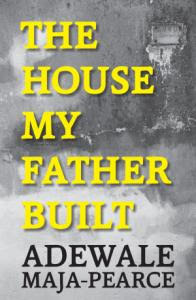Features
#LiterallyWhat’sHot: Never Judge An Author By The Book Cover – A Review of Adewale Maja-Pearse’s “The House My Father Built”

In this present day and age, where a lot of fuss is made about objectification, and reducing a writer to either his mere physical appearance or his work, it was with some trepidation I received the copy of this book for review. I had previously met the author, Mr. Adewale Maja-Pearce, at a function at the Goethe Institute. With his height, hair, and nose, I thought he looked entirely too serious, so you can well imagine my unease when I heard that the book was nonfiction.
But that was before I turned the first page and fell straight, headlong.
The writing of Mr. Maja Pearce is brisk, beautiful; it clips along at a steady pace and robs you of all the things you ought to do, if you are like me, and it is in itself a testament to my self-discipline and strong sense of will that I put down this book after I had started, and did a few other things. The book, “The House My Father Built” is that engaging.
On the one hand, it is the humorous and engaging account of many a kindhearted landlord in the Lagos metropolis (and even beyond, there are scum tenants everywhere), with its rolling accounts of repeated court visits, injunctions and counter injunctions, and of course the disturbingly regular police visits and cases. A reader in this present day is encouraged to wonder at the apparent civility and eagerness to please the police until one takes into cognizance the somewhat European-ish appearance of Mr. Pearce, and then a few things fall into place. Almost every visit ends with an amount of money exchanging hands, and it is, to a common man, nothing short of amazing the way in which the court appearances are made to look fairly routine, as indeed they should be.
In Nigeria of today, and among the class of people who are tenants in the not-so-highbrow areas of the metropolis and beyond, getting sued to court is a big deal, perhaps two steps away from getting locked up indefinitely, and perhaps three steps short of being killed outright. The Nigerian Justice system is comatose like that.
On the other hand, “The House My Father Built” is the rather disturbing account of the institutionalization of corruption in almost every facet of our society, from the open consumption of weed (which, as at last check, is still illegal/criminalized), to the elevation of money for “bread for the children” to a tradition, a norm, regardless of whether the receiver has children or not. These issues only begin to show forth on a second reading, as the first is primarily concerned with what excellent writing this is.
There is also the thought that the tenants may have had the thought that they could “play” the author because of the sense of being foreign that is conveyed by the author’s appearance, since he looks very much like a white, and it made him unleash his “inner Lagosian”, and give them “follow up” that finally led to them all leaving the house, albeit after a protracted period of time. Viewed through another set of lenses, it is a fine analysis of the doggedness and tirelessness of (Nigerian) human nature, particularly when there is the possibility of something being had for free, or at another’s expense. And it is on this score that it gives me cause to ponder the most. Lastly, the book is a brilliant education for those who dismiss nonfiction as boring and staid and think that only fiction is good reading. Read this book and have your education upgraded.
And no, Mr. Maja-Pearce won’t even charge you school fees. You bought the book, didn’t you? That’s your tuition.
Finally, this brilliant book is proof positive that you should never judge a book by its genre, or by the author.
You can get a copy of “The House My Father Built” on Okadabooks. Please click here
**

Eye Kay Nwaogu is a writer, born in Nigeria, brought up all over the place, and chasing his dreams. He writes nonfiction, book and music reviews. But when he is writing fiction, his heart sings loudest. He is a lover of travel and food, and when he is not writing, he is seriously thinking of what to write, or read.















